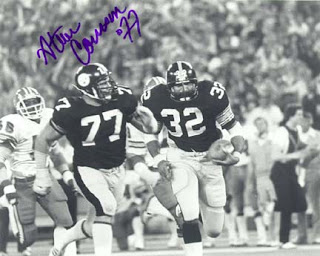 Former Steeler Courson outlines solutions for steroid use
Former Steeler Courson outlines solutions for steroid useWednesday, April 27, 2005
By Robert Dvorchak, Pittsburgh Post-Gazette
In another appearance before a congressional panel looking into the issue of steroids, Steve Courson will speak today from personal knowledge about the health effects of juicing and what he believes to be the scope of use by big-time athletes in this day and age.
But the former Steelers lineman and author of a book on steroids also will use his time under oath to offer potential solutions to the troublesome issue of adolescent steroid use.
"It's very easy to point the finger at a problem that's been long-standing and vexing," said Courson, who already has submitted a written statement that will become part of the Congressional Record. "One of the things I'm excited about is the opportunity to present some solution-oriented ideas. I guess I've come full circle on this issue."
Courson, a personal trainer and professional speaker, was a one-time candidate for a heart transplant because of steroid-related afflictions. He also counsels overweight kids and believes a combination of actions could provide the intervention necessary to contain steroid use without cost-prohibitive testing of high school students in Pennsylvania and other states.
Steps would include a national steroids policy by a group such as the National Federation of State High School Associations coupled with an education program that would help school nurses identify potential users.
Courson's proposal would use the body mass index, or the height-to-weight ratio used to identify obesity, as a way of spotting steroid users.
"What you could do with that tool is use it as a marker to identify, say, a 10th-grader who gained 25 pounds of lean body mass in a year. You could have school nurses look for telltale signs of steroid use like acne and oily skin. It would help 'red flag' some of these kids at risk," Courson said.
States such as Florida, Minnesota, Michigan and Texas are considering testing high school athletes, but, at $100 per test per student, the costs would be enormous.
Courson did not require a subpoena to appear in front of the House Committee on Government Reform, which is having a series of hearings that could lead to a single agency overseeing drug testing in professional, college and high school sports. An estimated 500,000 high school students have tried steroids, according to committee chairman Tom Davis, R-Va.
Also appearing will be NFL commissioner Paul Tagliabue and Gene Upshaw of the NFL Players Association, among others.
The NFL phase of the hearings likely will be less contentious than the 11-hour marathon last month involving Major League Baseball's policies, which came into question in part because of Jose Canseco's tell-all book "Juiced."
The NFL instituted steroid testing in 1987, four years before steroids were classified as a controlled substance under federal law and 15 years before Major League Baseball players were subjected to testing. The NFL and its union are considering tightening the testing trigger that currently exists.
When Courson was an offensive guard with the Steelers, a banner depicting him as a mutated "Incredible Bulk" used to hang at Three Rivers Stadium. He outlined his use of steroids, beginning with Dianabol, in "False Glory" -- his 1991 book that got him blackballed by his peers.
Courson previously testified before the Senate Judiciary Committee in 1989 as Congress was in the process of making it a federal crime to possess and distribute steroids without a prescription.
By the time Courson retired in 1988, after winning two Super Bowl rings and contending for the title of NFL's Strongest Man, doctors had told him his heart muscles had weakened to the point that he would survive only a few years if he didn't have a heart transplant.
He attributed his cardiomyopathy to a combination of factors -- steroid use, the stress placed on his heart by the added weight he gained and a poor lifestyle that included alcohol abuse. He never got the transplant, but remedied his condition through diet and exercise.
Courson, 49, wonders about the next generation of performance enhancers. Anabolic steroids might have reached the limits of their effectiveness, but genetic engineering is on the horizon. That technique alters genes to remove the mechanism that regulates how big the body will grow. No test, no matter how effective, can stop the next potential beast.
"Performance-enhancers are not a sports issue, but a societal issue," Courson said. "We embrace instant gratification. We're a society that embraces 'bigger, faster, stronger' and winning at all costs. This is going to be a difficult nut to crack. We've opened a Pandora's box, and we're still trying to figure out how to close it."
(Robert Dvorchak can be reached at bdvorchak@post-gazette.com or 412-263-1959. Click here for more National Football League news.)
No comments:
Post a Comment